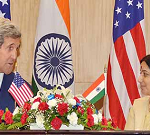A delegation of high-ranking officials from the U.S, led by Secretary of State John Kerry, will be in New Delhi for the 5th India-U.S Strategic Dialogue on 31 July 2014. India’s External Affairs Minister, Sushma Swaraj, will co-chair the dialogue with John Kerry. Neelam Deo, director at Gateway House, comments on the status of the bilateral and the expected outcomes of the dialogue.
Statement:
“The 5th India-U.S Strategic Dialogue will lay the groundwork for Prime Minister Modi’s visit to the U.S in August. The meeting will review the current status of the bilateral and the impact of global events on relations between the two countries.
India and the U.S should seek convergence on issues of mutual interest, particularly the maintenance of stability in the region. Anti-India terror groups emanating from Pakistan pose a major security concern. As India works to improve relations with Pakistan, the U.S needs to take a more assertive stance on the country’s tolerance of such groups. The current situation in Afghanistan is precarious following the disputed presidential election outcome. President Obama’s announcement on 25 May 2014 declaring that only 9,800 U.S service members will remain in Afghanistan at the beginning of 2015 will have repercussions for the region. The U.S and India should work together to limit Pakistani involvement with the resurgent Taliban. The destabilising situations in Iraq and Syria also need to be addressed collectively. As the U.S advances towards an agreement on Iran’s nuclear programme and eases sanctions on it, India’s energy security dilemma will be mitigated.
That said, India and the U.S should agree to disagree regarding international developments on which the two countries are on different sides of the spectrum, such as Ukraine and Israel. The UNHRC Resolution to probe the Israeli offensive in Gaza was supported by India and the other BRICS countries – the U.S was the only country to vote against it. Regarding Ukraine, India is more sensitive to Russia’s security concerns, while the U.S imposes further sanctions. The U.S must moderate the tenor and frequency of its criticism on such issues – stridency will only come in the way of achieving larger bilateral objectives.
Under the new government, India’s positions will be clearly articulated. Most importantly, the new government is likely to focus on implementation of agreements flowing from the India-U.S Strategic Dialogue, which will make the relationship more purposeful. The tendency to linger on small differences will diminish.”
For more information or interview requests, please contact Reetika Joshi at joshi.reetika@gatewayhouse.in.


